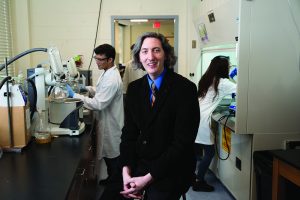Adelphi students and their professor, Ivan Fabe Dempsey Hyatt, Ph.D. are discovering reactions that form molecules that may contribute to the development of new products and pharmaceuticals.
This is how his students describe a professor who rocks—in and out of the lab.

In Blodgett Hall, you’ll find the Hyatt Research Group—Adelphi students and their professor, Ivan Fabe Dempsey Hyatt, Ph.D. Under Dr. Hyatt’s tutelage, they’re performing the work of professional chemists: discovering reactions that form molecules that may contribute to the development of new products and pharmaceuticals.
At most universities, only graduate students, or maybe juniors and seniors, would get the opportunity to work in such a lab. But in Dr. Hyatt’s lab, underclassmen are welcome.
Working in what’s called a wet lab, with undergraduates, at a school like Adelphi, in New York—it’s exactly where Dr. Hyatt wants to be.
He grew up in a small town in North Carolina “that had about 300 people,” he said. “It was a big deal when we got a stoplight in 2005.” As an undergraduate, he attended a university similar to Adelphi, then a much larger university to study computational chemistry.
His teaching preference was to get back into the wet lab at a smaller school, he said. “I always enjoyed teaching at the undergrad level, introducing new topics and working with different types of students. It’s refreshing.”
Shining a Light on Iodine
Dr. Hyatt also found his home on the periodic table working with the element iodine, specifically—and serendipitously—with molecules known as HIAT: no relationship to Dr. Hyatt, of course, but hypervalent iodonium alkynyltriflates. The term’s a mouthful, but it basically describes molecules with iodine atoms whose outer shells contain more than the element’s usual eight electrons.
One of the Hyatt Group’s projects is to create molecules that will fluoresce when sensing the higher metal concentrations found in cancer cells. The ability to pinpoint cancer cells more precisely would enable surgeons to better preserve healthy cells and organs, thus improving patients’ quality of life after surgery.
Dr. Hyatt also teaches his students presentation skills and searches for opportunities for them to conduct research, including trips to Brookhaven National Laboratory to work with the lab’s scientists and equipment.
Outside the lab, Dr. Hyatt gets reactions from audiences when he plays guitar in progressive thrash-metal bands. And he’s in the process of finishing two science fiction novels about the adventures of a tall chemist who can move atoms with his mind. Semiautobiographical? Not exactly, but we wouldn’t be surprised.
For further information, please contact:
Todd Wilson
Strategic Communications Director
p – 516.237.8634
e – twilson@adelphi.edu